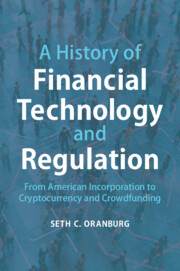 A History of Financial Technology and Regulation
A History of Financial Technology and Regulation Book contents
5 - Computational Asymmetry
from The Second Era
Published online by Cambridge University Press: 24 March 2022
Summary
This Chapter examines the American economy during World War II, with a particular focus on the emergence of computer technologies and its impact on financial markets. The Investment Company Act of 1940 originally sought to regulate “actively managed” mutual funds; soon, however, computer technology enabled a new financial product, the “passively managed” fund. Investment advisors increasingly were replaced by computers that managed and balanced funds more rapidly and efficiently. Computer-managed index funds that trade based on a static algorithms are not subject to the typical agency problems that arise when humans make decisions on behalf of others. However, algorithms may be subject to bias when their code is created by imperfect human beings. Software is only as good as its design. This technology spawned a host of new risks. Algorithms failed spectacularly in instances such as the Flash Crash. In response, regulators instituted new securities regulations, including Regulation NMS .Computers networked on the new internet helped the American economy recover from yet another financial crisis as public attitude towards corporations and “Trickle-Down Economics” began to sour.
Keywords
- Type
- Chapter
- Information
- A History of Financial Technology and RegulationFrom American Incorporation to Cryptocurrency and Crowdfunding, pp. 51 - 66Publisher: Cambridge University PressPrint publication year: 2022
